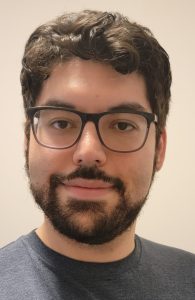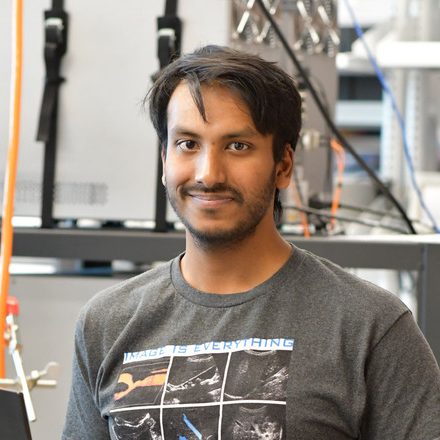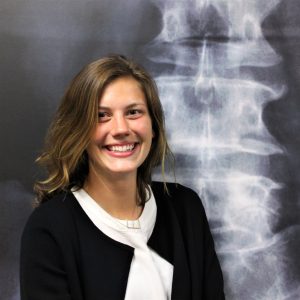The NIH National Research Service Awards are a series of prestigious grants that provide funding to support research training and career development at various stages of academic and professional careers. These awards are sponsored by the National Institutes of Health (NIH) and are available to individuals pursuing careers in biomedical, behavioral and social science research.
The NRSA program is highly competitive, and applicants are evaluated based on their academic and research achievements and their potential to become independent researchers. The program aims to support the development of a diverse and highly skilled biomedical research workforce.
 Joseph Berman, a fourth-year ECE Ph.D. candidate, received a National Research Service Award (NIH F31) for his project entitled “Development of a Novel EMG-Based Neural Interface for Control of Transradial Prostheses with Gripping Assistance.” Myoelectric prostheses have been shown to restore some of the functionality of the upper limb in amputee patients. However, in many common control methods, grasping fragile objects is challenging because of the possibility of an erroneous overexertion of grip force by the controller. In this research, I will develop a novel shared-control framework that prevents held objects from dropping while minimizing damage to fragile and deformable objects. The outcomes of this research in the Neuromuscular Rehabilitation Engineering Laboratory may improve the usability and intuitiveness of future upper-limb prostheses.
Joseph Berman, a fourth-year ECE Ph.D. candidate, received a National Research Service Award (NIH F31) for his project entitled “Development of a Novel EMG-Based Neural Interface for Control of Transradial Prostheses with Gripping Assistance.” Myoelectric prostheses have been shown to restore some of the functionality of the upper limb in amputee patients. However, in many common control methods, grasping fragile objects is challenging because of the possibility of an erroneous overexertion of grip force by the controller. In this research, I will develop a novel shared-control framework that prevents held objects from dropping while minimizing damage to fragile and deformable objects. The outcomes of this research in the Neuromuscular Rehabilitation Engineering Laboratory may improve the usability and intuitiveness of future upper-limb prostheses.
Emily Eichenlaub, a third-year BME Ph.D. student, has received a National Research Service Award (NIH F31) from the National Institute of Aging. The award will fund her project titled “The Proactive and Reactive Neuromechanics of Instability in Aging and Dementia with Lewy Bodies.” The research will establish the effects of age and dementia on proactive and reactive neuromechanics underlying vulnerability to balance challenges. Emily will be sponsored by Dr. Jason Franz, Associate Professor in BME, and a mentoring committee that spans Engineering, Physical Therapy, Neurology and Biostatistics. Her research in the BME Applied Biomechanics Lab will pave the way for clinical translation in the prescription of personalized interventions, wearable sensor monitoring to mitigate falls and the development of assistive devices with onboard monitoring of muscle neuromechanics to deliver assistance in the face of a balance challenge.
Nina Moiseiwitsch, a third-year BME Ph.D. candidate, received a National Research Service Award (NIH F30) for her project involving colloidal microporous surgical sealant, which assists with improving outcomes for patients during surgical procedures. Vascular anastomosis – the joining of two blood vessels using stitches – plays a central role in numerous life-saving surgeries but has serious associated complications and long recovery times. Currently, these issues can be addressed by the application of fibrin glues, but these materials have limited practical application due to cold chain requirements and short work time, and their high-density structure leads to suboptimal healing. Moiseiwitsch’s research focuses on the development of a novel colloidal microporous surgical sealant made using fibrin-based nanoparticles. The goal of her work is that this novel material will display improved work time and enhanced drug delivery profiles that boast superior wound healing capabilities compared to traditional fibrin glues, allowing for faster operating times, fewer complications, improved recovery and more widespread access by removing cold-chain requirements.
 Andy Shelton, also a third-year BME Ph.D. candidate, has received a National Research Service Award (NIH F31) from the National Institute of Aging. The award will fund his project titled “The Effects of Muscle Fatigability on Gait Instability in Aging and Age-Related Falls Risk.” The research will evaluate how local muscle fatigability compromises the neuromuscular control of walking balance and precipitates gait instability in direction-dependent and context-specific ways in older adults. Andy will be sponsored on the project by Dr. Jason Franz, Associate Professor in BME, and a mentoring committee that spans Engineering, Physical Therapy, Neurology and Biostatistics. Anticipated outcomes from his research in the BME Applied Biomechanics Lab will have the potential to inform novel advances in diagnostics, rehabilitation, mobile monitoring and wearable assistive technologies to mitigate falls.
Andy Shelton, also a third-year BME Ph.D. candidate, has received a National Research Service Award (NIH F31) from the National Institute of Aging. The award will fund his project titled “The Effects of Muscle Fatigability on Gait Instability in Aging and Age-Related Falls Risk.” The research will evaluate how local muscle fatigability compromises the neuromuscular control of walking balance and precipitates gait instability in direction-dependent and context-specific ways in older adults. Andy will be sponsored on the project by Dr. Jason Franz, Associate Professor in BME, and a mentoring committee that spans Engineering, Physical Therapy, Neurology and Biostatistics. Anticipated outcomes from his research in the BME Applied Biomechanics Lab will have the potential to inform novel advances in diagnostics, rehabilitation, mobile monitoring and wearable assistive technologies to mitigate falls.
 Keerthi Anand, a fourth-year BME Ph.D. candidate, received an NIH National Research Service Award (NIH F31) for his research on the use of ultrasound imaging in stroke prevention. Ischemic strokes are one of the leading causes of death in the world and are the result of the rupture of atherosclerotic plaques in the carotid artery. However, diagnostic tools to rapidly and accurately predict if and when a plaque will rupture currently do not exist, and as a result, many people undergo invasive surgeries to excise the plaques unnecessarily. His research involves first developing a new ultrasound imaging technology that can concurrently provide information about the plaque morphology, display blood flow profiles around the plaque, estimate the shear stresses on the plaque walls and then validate it in excised human cadaveric carotids. He predicts that with this holistic way of visualizing the risk factors of plaque rupture, it will be possible to identify differences in interactions of shear stresses and the plaque components between patients who have strokes versus those who do not.
Keerthi Anand, a fourth-year BME Ph.D. candidate, received an NIH National Research Service Award (NIH F31) for his research on the use of ultrasound imaging in stroke prevention. Ischemic strokes are one of the leading causes of death in the world and are the result of the rupture of atherosclerotic plaques in the carotid artery. However, diagnostic tools to rapidly and accurately predict if and when a plaque will rupture currently do not exist, and as a result, many people undergo invasive surgeries to excise the plaques unnecessarily. His research involves first developing a new ultrasound imaging technology that can concurrently provide information about the plaque morphology, display blood flow profiles around the plaque, estimate the shear stresses on the plaque walls and then validate it in excised human cadaveric carotids. He predicts that with this holistic way of visualizing the risk factors of plaque rupture, it will be possible to identify differences in interactions of shear stresses and the plaque components between patients who have strokes versus those who do not.




